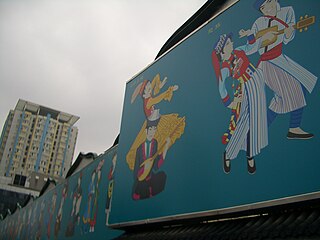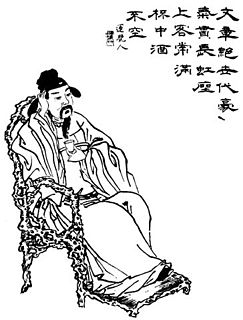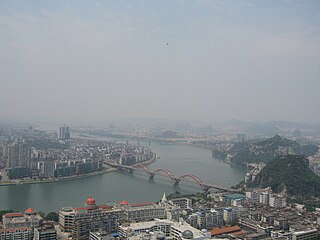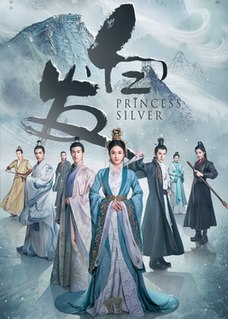
The Battle of Fei River, also known as "Feishui" was a battle in AD 383, where Fu Jiān of the Di Former Qin Empire was decisively defeated by the outnumbered Jin army of Eastern Jin. The battle is considered to be one of the most significant battles in the Chinese history. The aftermath of the battle included the Former Qin Empire falling into massive civil war and its eventual destruction, ensuring the survival of Eastern Jin and other Chinese regimes south of the Yangtze River (长江).

The Nu people are one of the 56 ethnic groups recognized by the People's Republic of China. Their population of 27,000 is divided into the Northern, Central and Southern groups. Their homeland is a country of high mountains and deep ravines crossed by the Dulong, Irrawaddy, and Nujiang rivers. The name "Nu" comes from the fact that they were living near the Nujiang river, and the name of their ethnic group derives from there.

Kong Rong (153–208), courtesy name Wenju, was an official, scholar and minor warlord who lived during the late Eastern Han dynasty of China. He was a 20th generation descendant of Confucius. As he was once the Chancellor of Beihai State, he was also known as Kong Beihai. He was defeated by Yuan Tan in 196 and escaped to the capital Xuchang. For being a political opponent of Cao Cao and humiliating him on multiple occasions, Kong Rong was eventually put to death on various charges.
The Seven Sages of the Bamboo Grove were a group of Chinese scholars, writers, and musicians of the third century CE. Although the various individuals all existed, their interconnection is not entirely certain. Several of the seven were linked with the Qingtan school of Daoism as it existed in the state of Cao Wei.

Rong Yiren was the Vice President of the People's Republic of China from 1993 to 1998 and was heavily involved with the opening of the Chinese economy to western investment. Rong is known both in China and in the Western world as "the Red Capitalist" because his family were some of the few pre-1949 industrialists to have been treated well by the Communist Party of China in return for their co-operation with the government of the People's Republic of China.

The Di or Beidi were various ethnic groups who lived north of the Chinese (Huaxia) realms during the Zhou dynasty. Although initially described as nomadic, they seem to have practiced a mixed pastoral, agricultural, and hunting economy and were distinguished from the nomads of the Eurasian steppe (Hu) who lived to their north. Chinese historical accounts describe the Di inhabiting the upper Ordos Loop and gradually migrating eastward to northern Shanxi and northern Hebei, where they eventually created their own states like Zhongshan and Dai. Other groups of Di seem to have lived interspersed between the Chinese states before their eventual conquest or assimilation.

Central Min, or Min Zhong, is a part of the Min group of varieties of Chinese. It is spoken in the valley of the Sha River in Sanming prefecture in the central mountain areas of Fujian, consisting of Yong'an, the urban area of Sanming and Sha County.

The Rong River is a river in Guangxi province in China. The river runs through the towns of Sanjiang and Rongshui. Parts of the river valley around the township of Longsheng are inhabited by the Zhuang people who live in traditional wooden houses on the river.
Wen Wu Ding or Wen Ding, personal name Zǐ Tuō, was a king of the Shang dynasty of China from 1116 to 1106 BC.
Rong or RONG may refer to:
Su Rong is a former senior regional official and politician in China. He began his career in his native Jilin, and successively served as Communist Party Secretary of Qinghai, Gansu, and Jiangxi provinces. In March 2013, he became one of the vice-chairmen of the Chinese People's Political Consultative Conference (CPPCC).

Li County or Lixian is an administrative division of the prefecture-level city of Longnan in southeastern Gansu, a northwestern province of China. The 2010 Chinese census found a population of 458,237, a decline of around 25,000 from the year 2000 but still placing it second in size within its prefecture.

Rongshui Miao Autonomous County is under the administration of Liuzhou, Guangxi Zhuang Autonomous Region, China. The seat of Rongshui County is Rongshui Town. It borders the prefecture-level divisions of Qiandongnan (Guizhou) to the north and Hechi to the west.

Xirong or Rong were various people who lived primarily in and around the extremities of ancient China known as early as the Shang dynasty. They were typically to the west of the later Zhou state from the Zhou Dynasty onwards. They were mentioned in some ancient Chinese texts as perhaps related to the people of the Chinese civilization.

The Liu River is a tributary within the Pearl River system in Guangxi, China. It is formed by the confluence of the Rong and Long rivers in Fengshan. It flows south through Liuzhou and then the Luoqing Jiang enters from the north. It meets the larger Hongshui He east of Laibin where it becomes known as the Qian Jiang.

The Long River is a river system in northern Guangxi Province, China. It is a part of the larger Pearl River system by way of the Liu, Qian, Xun, and Xi Rivers. Its true source is in Sandu Shui Autonomous County, Guizhou, where it is known as the Dagou He. It becomes the Jincheng Jiang after entering Guangxi and passes through Hechi. After joining with its left tributary, the Xiaohuan Jiang, it becomes known as the Long Jiang. It then passes through Yizhou before meeting with the Rong Jiang to become the Liu.

Rong Guotuan was a Chinese table tennis player. He won the men's singles title at the 1959 World Table Tennis Championships in Dortmund, the first world championship winner representing the People's Republic of China. During the Cultural Revolution, Rong was persecuted as a "spy suspect". He committed suicide on June 20, 1968.

The Strange House is a 2015 Chinese 3D horror thriller film directed by Danny Pang Phat. The film was released on July 24, 2015.

Yiqu, was an ancient Chinese state which existed in the Hetao region and what is now Ningxia, eastern Gansu and northern Shaanxi during the Zhou dynasty, and was a centuries-long western rival of the state of Qin. It was inhabited by a semi-sinicized people called the Rong of Yiqu, who were regarded as a branch of western Rong people by contemporary writers, whom modern scholars have attempted to identify as one of the ancestors of the minority people in Northwest China.

Princess Silver is a 2019 Chinese television series based on the novel Bai Fa Wang Fei by Mo Yanshang. It stars Zhang Xueying, Aarif Rahman, Jing Chao, Luo Yunxi and Chen Xinyu. It aired on iQiyi, Tencent and Youku on May 15, 2019.














